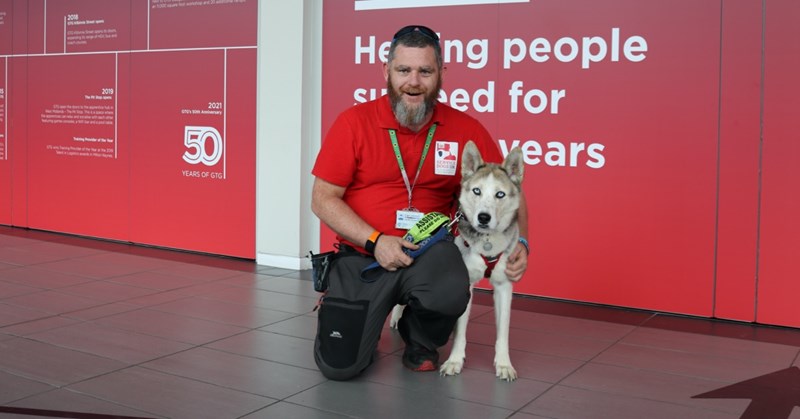James McGrattan suffers from Post Traumatic Stress Disorder (PTSD), a life-altering but often misunderstood condition. However, his ambition to learn new skills and to help others brought him to GTG Glasgow, to study for a NEBOSH health and safety qualification.

Who can be affected by PTSD in society?
‘PTSD sufferers aren’t just ex-soldiers – they are just the more documented sufferers of the condition. Anyone can get PTSD; emergency service personnel, civilians and even members of the public can experience PTSD after witnessing events that are particularly traumatic to them.’
What help does an assistance dog offer a PTSD sufferer?
‘There is less understanding of assistance dogs for sufferers of conditions like PTSD than perhaps there is around guide dogs for the blind or visually impaired.
‘These animals, such my own assistance dog, Dakota, are trained to intervene should a sufferer display signs of stress or anxiety due to PTSD.’
What special training does Dakota, your assistance dog, have to help you in everyday life?
‘At home, little things can suddenly take on much higher importance, and really shake you. Losing a simple object like a pen, for example, has put me in a panic, to a level that nothing else at that point matters. And Dakota is specially trained to intervene in such situations, by being close to you, essentially getting in your face, to get your attention and calm you down.
‘For outside situations, like taking public transport, service dogs that have done their access test have a card with a serial number, which the owner will carry to show they have a service dog.
‘On public transport, these dogs are highly trained to stay with their owner. There is no jumping up on seats, licking or clawing surfaces. That goes for more confined spaces, too, like taxis.’
You’re wearing a charity’s logo on your jersey – can you tell us about it, and why it is significant for you?
‘Service Dogs UK is a charity based primarily in the southeast of England, which helps to train assistance dogs from a rescue environment and provide them to ex-armed forces and ex-emergency service personnel, to help PTSD sufferers in their everyday lives.
‘Dakota has been brilliant for me in managing my PTSD and I would like to raise awareness of the service the charity offers, and perhaps even one day, help the charity establish itself in Scotland.’
Why did you want to study in the field of health and safety at GTG?
‘My ambition is to eventually work in health and safety in my own right, so I’ve been studying the NEBOSH National General Certificate, which is an introduction into health and safety through a nationally recognised qualification.’
How have you found GTG as a place to learn and train?
‘GTG as a company has been really helpful, as have the employees whenever I’ve been around the training centre. Little things, like leaving a water bowl in the reception area for Dakota, and the canteen staff packing my lunch in a paper bag so that I can get around more easily, have been really appreciated.
‘A great thing about GTG has been the personal touch around the place. It was like the staff knew who I was before I even got here, from the team at reception helping to guide me wherever I needed to go, to the trainers being interested in me as a learner rather than simply paying service to my assistance dog, which commonly happens – it’s been a great environment to learn in.
‘In the classroom, the trainers are very professional and knowledgeable, but also very understanding of a candidate’s particular needs, such as in my case with my assistance dog.
‘In terms of the training centre building itself, I’ve found the layout of GTG Glasgow really good for getting around. I can’t fault the experience I’ve had here.’
To find our range of health and safety courses, visit our health and safety course section.